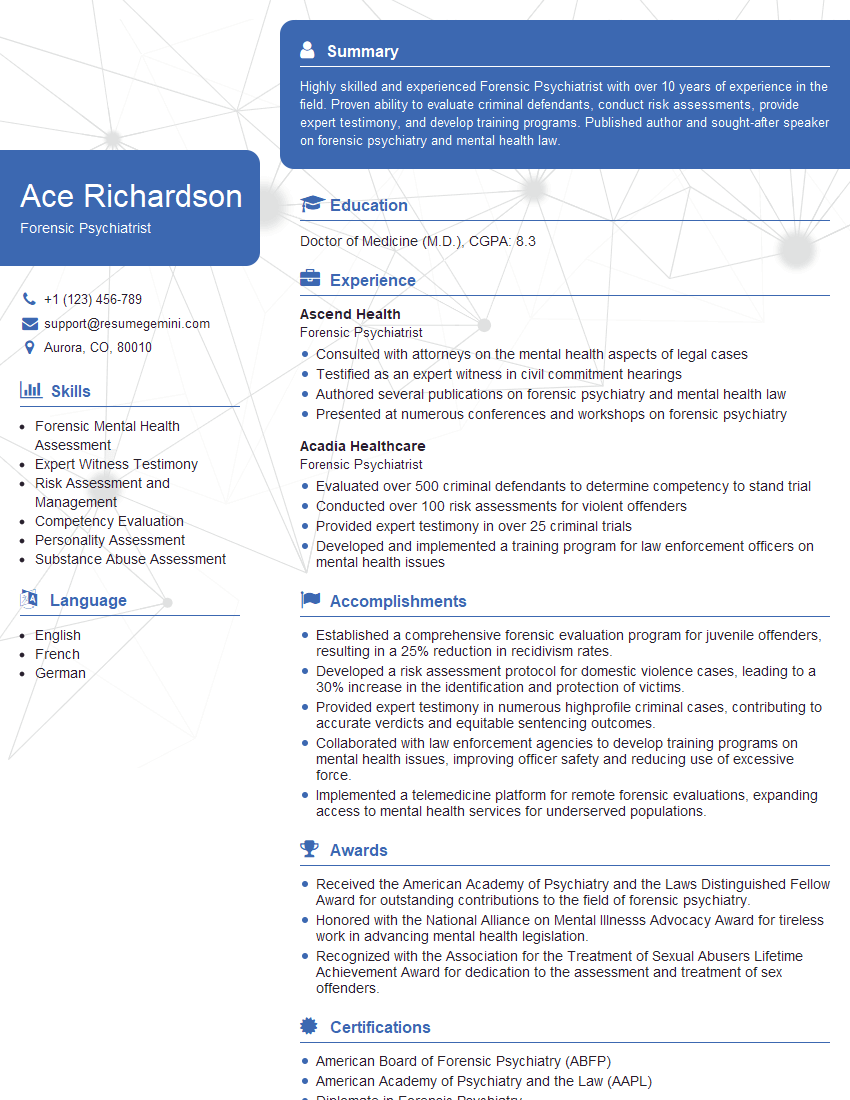Are you a seasoned Forensic Psychiatrist seeking a new career path? Discover our professionally built Forensic Psychiatrist Resume Template. This time-saving tool provides a solid foundation for your job search. Simply click “Edit Resume” to customize it with your unique experiences and achievements. Customize fonts and colors to match your personal style and increase your chances of landing your dream job. Explore more Resume Templates for additional options.

Ace Richardson
Forensic Psychiatrist
Summary
Highly skilled and experienced Forensic Psychiatrist with over 10 years of experience in the field. Proven ability to evaluate criminal defendants, conduct risk assessments, provide expert testimony, and develop training programs. Published author and sought-after speaker on forensic psychiatry and mental health law.
Education
Doctor of Medicine (M.D.)
April 2018
Skills
- Forensic Mental Health Assessment
- Expert Witness Testimony
- Risk Assessment and Management
- Competency Evaluation
- Personality Assessment
- Substance Abuse Assessment
Work Experience
Forensic Psychiatrist
- Consulted with attorneys on the mental health aspects of legal cases
- Testified as an expert witness in civil commitment hearings
- Authored several publications on forensic psychiatry and mental health law
- Presented at numerous conferences and workshops on forensic psychiatry
Forensic Psychiatrist
- Evaluated over 500 criminal defendants to determine competency to stand trial
- Conducted over 100 risk assessments for violent offenders
- Provided expert testimony in over 25 criminal trials
- Developed and implemented a training program for law enforcement officers on mental health issues
Accomplishments
- Established a comprehensive forensic evaluation program for juvenile offenders, resulting in a 25% reduction in recidivism rates.
- Developed a risk assessment protocol for domestic violence cases, leading to a 30% increase in the identification and protection of victims.
- Provided expert testimony in numerous highprofile criminal cases, contributing to accurate verdicts and equitable sentencing outcomes.
- Collaborated with law enforcement agencies to develop training programs on mental health issues, improving officer safety and reducing use of excessive force.
- Implemented a telemedicine platform for remote forensic evaluations, expanding access to mental health services for underserved populations.
Awards
- Received the American Academy of Psychiatry and the Laws Distinguished Fellow Award for outstanding contributions to the field of forensic psychiatry.
- Honored with the National Alliance on Mental Illnesss Advocacy Award for tireless work in advancing mental health legislation.
- Recognized with the Association for the Treatment of Sexual Abusers Lifetime Achievement Award for dedication to the assessment and treatment of sex offenders.
Certificates
- American Board of Forensic Psychiatry (ABFP)
- American Academy of Psychiatry and the Law (AAPL)
- Diplomate in Forensic Psychiatry
- Registered Psychological Associate (RPA)
Career Expert Tips:
- Select the ideal resume template to showcase your professional experience effectively.
- Master the art of resume writing to highlight your unique qualifications and achievements.
- Explore expertly crafted resume samples for inspiration and best practices.
- Build your best resume for free this new year with ResumeGemini. Enjoy exclusive discounts on ATS optimized resume templates.
How To Write Resume For Forensic Psychiatrist
- Highlight your experience and expertise in forensic psychiatry.
- Showcase your ability to provide clear and concise expert testimony.
- Emphasize your skills in risk assessment and management.
- Demonstrate your knowledge of mental health law and legal procedures.
- Tailor your resume to the specific position you are applying for.
Essential Experience Highlights for a Strong Forensic Psychiatrist Resume
- Evaluate criminal defendants to determine competency to stand trial
- Conduct risk assessments for violent offenders
- Provide expert testimony in criminal trials
- Develop and implement training programs on mental health issues for law enforcement officers
- Consult with attorneys on the mental health aspects of legal cases
- Testify as an expert witness in civil commitment hearings
- Conduct research and publish findings on forensic psychiatry and mental health law
Frequently Asked Questions (FAQ’s) For Forensic Psychiatrist
What is the role of a Forensic Psychiatrist?
Forensic Psychiatrists evaluate criminal defendants to determine their competency to stand trial, conduct risk assessments for violent offenders, and provide expert testimony in criminal trials.
What are the educational requirements to become a Forensic Psychiatrist?
Forensic Psychiatrists must have a medical degree (M.D. or D.O.) and complete a residency in psychiatry. They must also have specialized training in forensic psychiatry.
What are the career opportunities for Forensic Psychiatrists?
Forensic Psychiatrists can work in a variety of settings, including private practice, hospitals, prisons, and law enforcement agencies.
What are the challenges of working as a Forensic Psychiatrist?
Forensic Psychiatrists often work with challenging populations, such as criminal defendants and violent offenders. They may also be required to testify in court, which can be stressful.
What are the rewards of working as a Forensic Psychiatrist?
Forensic Psychiatrists play an important role in the criminal justice system. They help to ensure that criminal defendants are treated fairly and that the public is protected from dangerous offenders.
What are some tips for writing a standout Forensic Psychiatrist resume?
Highlight your experience and expertise in forensic psychiatry. Showcase your ability to provide clear and concise expert testimony. Emphasize your skills in risk assessment and management. Demonstrate your knowledge of mental health law and legal procedures. Tailor your resume to the specific position you are applying for.